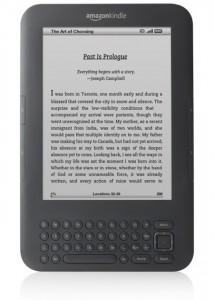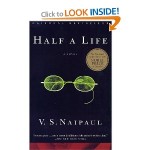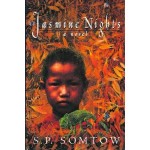 One burning issue du jour concerns the relative merits of Kindles and iPads. But rarely, now, does discussion swing around to the real advantages of traditional paper books.
One burning issue du jour concerns the relative merits of Kindles and iPads. But rarely, now, does discussion swing around to the real advantages of traditional paper books.
If only paper books could perform word searches, eh? How I wished for the missing function when I went looking for a passage I dimly remembered reading somewhere—something to the effect that night air was sweating the fragrance of jasmine. I wanted to use something dangerously similar in a story I was writing, but I didn’t want to steal the image.
 My first guess was I’d seen something in Half a Life, by V.S. Naipaul, a short novel I’d just read that was partly set in the tropics. I skimmed through the book again and again, but couldn’t find the image. Then it occurred to me—hey, not that the book title held any clue—to look at Somtow’s Jasmine Nights. And, big surprise, there it was.
My first guess was I’d seen something in Half a Life, by V.S. Naipaul, a short novel I’d just read that was partly set in the tropics. I skimmed through the book again and again, but couldn’t find the image. Then it occurred to me—hey, not that the book title held any clue—to look at Somtow’s Jasmine Nights. And, big surprise, there it was.
So, here’s an argument for e-books with all their electronic search functions and things, right? Not entirely.
In looking for the image in Naipaul, I learned something important. I’ve long admired him for his lean prose, but I hadn’t realized just how lean it really was. Not only didn’t I find the image I was looking for, I didn’t find any others either. That’s right—Naipaul wrote a whole book, complete with real characters in real dramatic situations in real settings, and he used almost no obviously descriptive language. The prose was barren of adjectives, adverbs and colorful metaphor. It takes an exceptional writer to perform this sort of magic.
But my point is this: if that book had offered a word search function, I would never have learned something quite astonishing about Naipaul and this book. Let’s hope that technology doesn’t program this sort of serendipity out of our reading and researching experiences.
Can anyone else contribute thoughts on ways modern book technology isn’t making our lives better after all–how paper books and traditional libraries might still be superior in some ways?

Facebook responses
Susan Rose Martin
Thanks for the insights, Collin. Point taken. One disadvantage that comes to mind is one that my biology professor friend complains about often: when he uses Power Point presentations instead of slides, the students don’t take notes and don’t do as well on exams.
22 hours ago · Like
Collin Piprell
Are you and Brad using e-book readers yet? (Or ever?)
22 hours ago · Like
Susan Rose Martin
Not yet, We’ve got two libraries on the mountain and are waiting to see if the technology leaps before we invest.
21 hours ago · Like
Roy Hurd
Down with books…everyone buy a Nook!
3 hours ago · Like
Susan Rose Martin
Roy, what’s the difference between a Kindle and a Nook? Online they look like the same thing. Is it just a different brand?
2 hours ago · Like
Collin Piprell
l I have a Kindle DX. Sara’s getting a Kindle 3. She says paper books are breeding grounds for dustmites, which, she claims, explains her incessant sneezing at night, which gives me dreams of being in nuclear wars and suchlike, and even though I reckon what it is, she’s finally developed an allergy to me. (On my blogsite, I’m asking visitors for advantages paper books have over e-readers, and look what she gives me.)
Susan wrote:
“And she’s right, too. To be honest, I can’t read the books in our libraries. Too much mildew.
Books have the same enemies as people: fire, humidity, animals, weather, and their own content.
– Paul Valery”
I suppose I should get a Kindle, at least to see if it has advantages. Sarapon has a point, I think I may have the same allergy (not to you, I’m sure you’ve got that one wrong) . . . but figure books need nothing but a digital power source (your own digits), and they’re hard to break. I imagine dropping in water wouldn’t be any worse for them than for the Kindle, and if you lose one you’ve only lost one book, not a fancy piece of equipment and a bezillion books. I could go on about the comfortable feeling of holding and reading a book, but that would probably mark me as old and out of touch. In any case, I don’t mind a few sneezes now and then.
For sure I don’t read on the Kindle in the bath. But the books are backed up, in case things do go wrong somehow. As far as power sources go, these gadgets run for about two weeks on one charge. … But I don’t mean to sound as though I’m touting them.